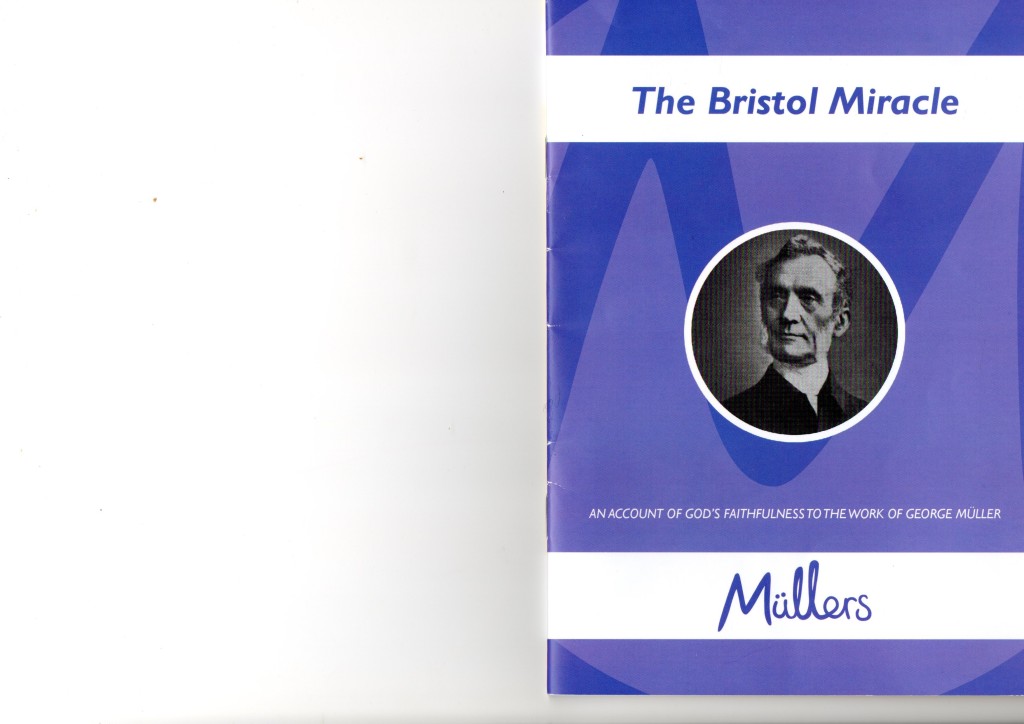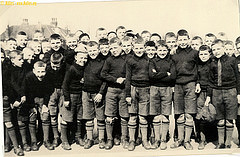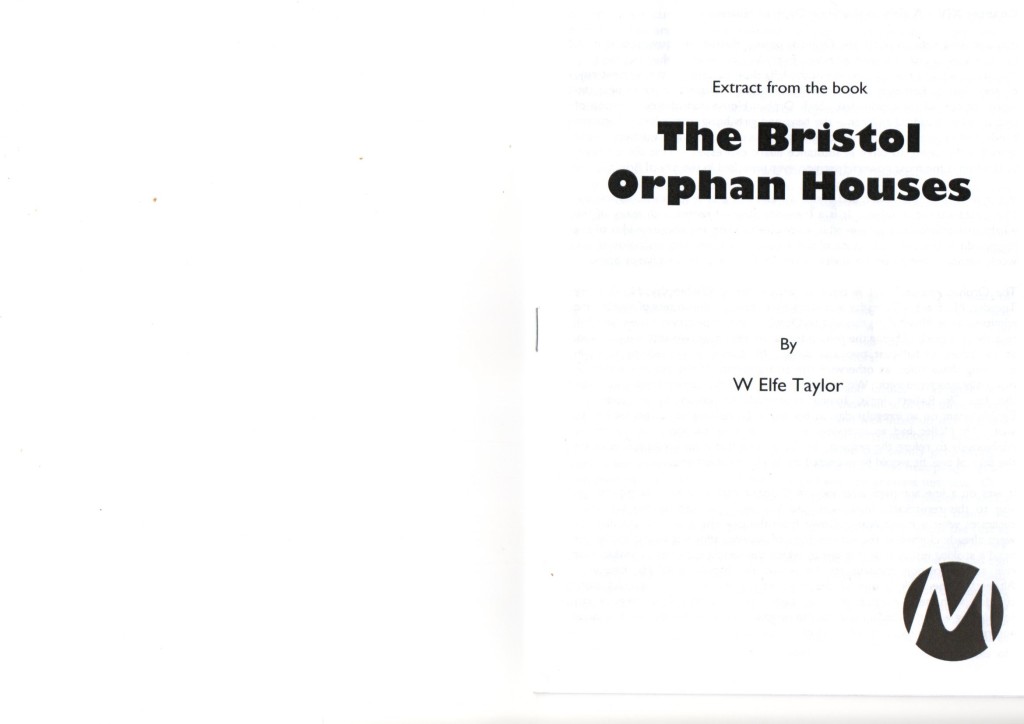H J Harris (b.1903): Home and Family
I have decided to have two separate sections for the theme of ‘Home and Family’ because HJ has memories from his time in an orphanage and about his family.
Home
‘To get an idea of the orphanage and people’s attitude towards orphans in the earlier Victorian periods you could do worse by not acquainting your good self with the life of George Müller, and the building of the orphan Houses.’(Harris, 17/10/83)
The Institution of Orphanage was known as the New Orphan Houses and was founded by George Müller who started off with little money and a lot of faith in God. It was his mission to teach the children the scriptures, so it was very important to him that the children learnt their bible.
‘Müller’s Orphanage was indeed considered “A modern miracle.’ (Harris, 18/06/78)
It was massive organisation with 5 houses that accommodated 2000 orphanages.
Each child had a uniform. I read in a booklet given to me by Müllers that the boys were given three suits, and those nine years and above wore a smart navy-blue Eton jacket, waistcoat and corduroy trousers together with a peaked cap. HJ remembers:
‘We wore distinctive dress. The boys wore heavy boots (which were polished with blacking). Grey socks, which we had to knit ourselves, corduroy trousers, and a black “Melton cloth” coat which fastened up to the neck, and finished with a neckband, over which the shirt collar turned. The headgear was a peaked hat (like a soldiers) but black.’ (Harris, 03/05/78)
Each child also had a school identification number too. HJ’s number was 12520. It is understandable that there had to be some sort of routine in place to control the huge amount of children at the orphanage but as HJ says,
‘I suppose this was to indicate which particular Jones or Smith might be alluded to, as with a large school there was bound to be some of the same surname.’ (Harris, 03/05/78)
Muller created The Scriptural Knowledge Institution, (or SKI) and it was an important part of the Orphanage. The children were heavily influenced by Scriptures and before breakfast the children would take turns reading aloud a verse of the Bible for that particular day. Religion played a huge part in the day to day life of the orphans at Müllers and although HJ mentions it in his memoirs he does not say that his life was made better for having religion in his life, unlike, other children who went to the Orphanage.
Mr Müller received many letters from ‘orphans formerly under our care, but now in service which gave me more joy than a considerable donation. The writer was brought to the knowledge of the Lord whilst under out care, and sent to service a believer’ (The Bristol Orphan Houses Booklet)
HJ does make reference to religion throughout his memoirs, although not as a believer, more with a mocking tone,
‘I weighed it up thus; if anyone can give any account of ATTITUDES AND MODES of thought of the 7th. Edwardian and early 5th. Georgian days, they would be now, either in heaven, singing Hallelujahs to their King, or stoking up for Lucifer, for eternity,’ (Harris, 18/06/78)
A typical day for a child in the institution consisted of strictly held routines,
‘We scrubbed floors, washed down paintwork, made beds and emptied chambers etc. And also we dug spuds, and heeled in cabbages, and the like. We knitted socks and sewed on our buttons. We made tables and forms to sit on. We mended shoes, or boots, as no one wore shoes those days’ (Harris, 17/10/83)
‘One day was like any other. There was no variety’. (Harris, 03/05/78)
I imagine that the routine would have been difficult and exhausting for any child to adhere to, in particular a child who was no doubt feeling very confused and missing his family. For a three year old to be taken from the arms of his mother and siblings must have been a terrible shock for him.
The language HJ uses in his letters, demonstrates that he likens the orphanage to a prison, with strict rules and regulations. And this is supported by what W Elfe Taylor wrote in The Bristol Orphan Houses book,
‘A prettier sight we have rarely witnessed than that of these destitute children, all marshalled in perfect order at word of command, and marching round the room to the sound of their own’
HJ talks of punishment with much anger and sadness and who can blame him. HJ was a bed wetter and was punished for the ‘crime’
‘Those who had wetted the bed had to stand out, which we did with hand-drawn expression, as it was considered very dirty and was put down to laziness and objectionable behaviour, and so punished by cold douches and deprivation of play time’ (Harris 30/01/84)
By reading HJ’s letters I can empathise with how he felt. He felt humiliated and it clearly affected his and the other children’s mood,
‘When ablutions were finished we then went out of the school main room and were supposed to be playing, but everybody was so miserable that all we did was to stand around like zombies.’ (Harris 03/05/78)
According to Muller all of the children at the orphanage work towards an apprentice and all leave with a job. However, for HJ that wasn’t the case. When HJ was discharged from the orphanage, he had nowhere to go and no work. This is because he was deemed unsociable because he was a bed wetter. This labelling had a huge negative impact on his life because without a job and nowhere to live, HJ found himself living on the streets.
HJ’s childhood was spent in an institution so he was ill-equipped to deal with the outside world. According to Burnett (p26) some event in childhood marks a turning-point in the development of the individual and I think that in HJ’s case there were several turning points in his life; Being labelled at the orphanage affected him immensely; and also the experiences he had upon leaving the orphanage. The mind can play tricks on ‘memories’ but the fact that HJ remembers them many years later indicates how much of an impression they made on him (Burnett 23).
Despite being educated and homed at Müllers, therefore with a good start in life, he realised that he was alone. I found in my research that several writers describe this as a growth of consciousness when ‘the realisation of a larger, stranger world, sometimes ugly and frightening, sometimes mysterious and beautiful’ (Burnett p26).
He didn’t fit in society and the way he spoke about things caused people to doubt his sanity. After a short time in a workhouse for boys he began life as a tramp. Read more about HJ’s experience in the Life and Labour section of the blog or alternatively read his transcribed letters.
Charles Dickens had heard a rumour that the children in the orphanage were being mistreated so he turned up unannounced and demanded a visit. Muller at first denied the request because it wasn’t a day when visits occurred but Dickens refused to leave. After a tour of the orphanage Dickens returned to London and wrote a fulsome report in Household Worlds, a weekly magazine which he edited.
HJ was admitted to an asylum in the early thirties and he
‘Found the routine quite similar to what [he] I had been used to 20 or so years before. We were counted in and counted out whenever we were to leave the permitted areas and were required to go “en masse” with a master who would be responsible for you, and good behaviour at all times. Willingly I will explain how life in a Victorian Orphanage could be paralleled to what I experienced in a lunatic asylum’ (Harris 30/01/84)
HJ talks of the ’regime’ in the orphanage with much disgust,
‘Believe me, Sir, when I think back on this orphanage and know what I do about inside Asylums, I would say that the former had more madmen inside than did the latter!’ (Harris, 03/05/78)
According to Burnett, (p30) for many auto biographers, childhood was a time of imagination and play, but unfortunately this was not the case for HJ. He had little time to escape into a fantasy world because his whole day was already planned for him. (p36) The free time for the children at the orphanage was quite limited according to HJ in a letter dated 17th October 1983.
‘We had no games, Indeed [indeed] such activities were frowned upon as worthless frivolities.’ (Harris, 17/10/83)
However, in his earlier letters he mentions,
‘We did a lot of Swedish drill, and also Indian Climb drill.’ (Harris, 03/05/78)
The Board of Education and The War Office devised a new programme of PE called the Model Course of Physical Training, following the humiliation of the British by a small group of Dutch settlers in the Boer War. The basic military drill was heavily criticised for treating children like soldiers.
‘It is important therefore that the short time claimed for physical training should be devoted wholly to useful exercises. No part of that time should be wasted on what is merely spectacular and entertaining, but every exercise should have its peculiar purpose and value in a complete system framed to develop all parts of the body’ https://sites.google.com/site/troopertoteacher/the-model-course-1902
Although HJ’s experience of orphan life are mostly negative, he does state that this is only his experience.
‘I wish to make it clear that I have not exaggerated or embellished my story in any way whatever. Everything is factual. I have put it this way because although they have been my experience they may not be universal’ (Harris, 04/05/78)
In the Muller handbook I read,
‘Although there were some children who did not enjoy life in the Homes, for many of them it became the means of their salvation. The alternative was little food, often no home and the meaning of life became a matter of survival. The future held little or no hope’ (p.14)
HJ writes,
‘I know this, there were many worse off who would have liked to have enjoyed the “wealth” that obtained inside the walls of Müllers. Poverty was really appalling, scraggy children with nothing on their feet. You can look at all the Oxfam pictures and adverts, such was common in the early years of this century IN ENGLAND! I’ve seen it!’(Harris, 30/01/84)
HJ feels that he was lucky despite being unhappy at the orphanage,
‘We saw lots of pale children about. Dirty and unkempt, maybe they all wore black socks, or did their bodies require scrubbing? As small and frail as we may have appeared we were a little bigger than many kids of our own age.’ (Harris, 18/06/78)
It wasn’t all doom and gloom at the orphanage,
‘I would like to tell you of some of the reliefs, which though trivial judged by today’s standards, were greatly appreciated by us inmates. There was, once a year, “Out-All-Day” (Harris, 20/03/79)
One day of the year the children came together, this was the only day of the year when all children from different houses saw each other. I imagine this outing must have taken a lot of planning given the amount of children who lived in the different houses!
‘The whole of the orphanage would set out on foot to PUR DOWN. We could spend the day as we wished, and have a good time picking buttercups and making daisy chains’. (Harris, 20/03/79)
I imagine the break in routine would be a huge relief for the children by breaking the monotony of the daily regime,
‘What the “Out-All Day” seems in retrospect was one long incessent service, only differing from the usual by the slight relax of the discipline associated with our religious performances, we could wander away or join in as we liked. AND we DID enjoy that immensely’.(Harris, 20/03/79)
There did not seem to be much excitement in the children’s lives ‘Our school was very bleak and spartan’. (Harris, 20/03/79), so when Christmas came around, the colour and the change in routine exhilarated them,
‘There was no decoration and no coverings on the floors, which were kept clean by hard scrubbing regularly, that the Christmas decorations made it look quite comforting and pleasant. At Christmas we would go to first one house to view their decorations, one one day and another house on another day, until each house had visited the five houses of the community. We would sing carols, (that we had specifically learned, for this occasion). On Christmas Day we would have some Christmas pudding instead of usual dinner and for tea we would be allowed extra bread AND JAM!’ (Harris, 20/03/79)
The exclamation mark emphasise the joy HJ felt with the change of diet. HJ says it best,
‘We had quite a lot to be grateful for’. (Harris 20/03/79)
Bibliography
Cannadine, David Class in Britain. New Haven and London: Yale UP, 1998. [Excellent resource-overview of class in 19th/20th Century]
Dickens, C Household Words A Working Journal Volume XV From January 3, 1857 to June 27, 1857. Being from No. 354 to No 379. London. 1857
Harris, H.J. Autobiographical letters, 1978-1984, TS, pp.13 (c5,000 words). Brunel University Library
Stanley, Liz edited by Documents of Life Revisited Narrative and Biological Methodology for a 21st Century Critical Humanism. Claire Lynch Chapter Critical Humanist Thoughts on the Burnett Archive of Working Class Autobiography: ‘Nobody wages war with Dostoevsky or Dickens’ Ashgate may 2013
Steedman, Carolyn. Past Tenses: Essays on Writing, Autobiography and History. Cambridge: Rivers Oram, 1992. {Discusses biography and autobiography as literary forms}





Leave a Reply